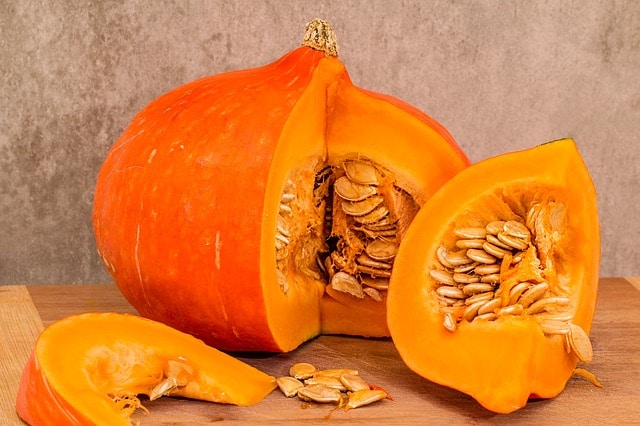Every dog owner understands his or her pup’s bathroom habits probably due to the unpleasant chore of cleaning up dog poop from time to time. It is, therefore, quite easy to notice if your furbaby falls off his ‘regular routine’.
Unlike other forms of stomach upset in dogs, constipation is not very common. In most cases, it is mild and tends to resolve quickly on its own or after giving your pup a few home remedies.
However, there are instances when it becomes serious, especially when it is related to an underlying health condition.
If your dog’s constipation is mild, a natural remedy may already be in your kitchen shelves: pumpkin.
Canned pumpkin is an excellent natural treatment for both diarrhea and constipation in dogs.
But how much should you give to a constipated dog? We’ll find out shortly but before then, let’s learn a few basics…
How Pumpkin Help With Constipation in Dogs

Pumpkin has high amounts of water and fiber and helps add bulk and soften a constipated dog’s stool. In other words, it acts as a natural laxative, making the stool easier to pass.
Besides helping your pup stay “regular”, pumpkin is a great addition to your dog’s diet because it is rich in a wide range of vitamins and minerals, including Vitamin A, Vitamin C, and Potassium.
Fiber is also known to act as a prebiotic, stimulating the growth of beneficial bacteria in your dog’s intestines and inhibiting the growth of bad or harmful bacteria.
But how can pumpkin help both diarrhea and constipation in dogs? This is a common concern among many dog owners, so you aren’t alone if you are asking this question.
The simple answer is: pumpkin has both soluble and insoluble fibers, which interact differently with your dog’s gastrointestinal health.
Soluble fiber, for instance, acts like a sponge when there is excess moisture in your pup’s GI tract (diarrhea).
On the other hand, insoluble fiber draws moisture into your dog’s GI tract when the stool is hard and dries (constipation) to make the stool bulkier and softer.
So, in the case of diarrhea, the soluble fiber in pumpkin slows down the GI tract while in the case of constipation, the insoluble fiber quickens bowel movements.
How Much Pumpkin Should You Give A Dog For Constipation?

How much pumpkin to give a dog for constipation largely depends on his size.
For a small dog, ½ teaspoonfuls will suffice though you can increase the quantity to 1-2 teaspoons when necessary.
For large dogs, you can start with 1-2 teaspoonfuls and slowly increase the amount if needed.
If you have a dog with a sensitive stomach, we recommend that you start him off with a smaller amount and wait to see his body’s reaction.
If your goal is to use the pumpkin to create a softer and loser stool, such as in the case where your dog is straining while defecating or after certain surgeries, you can feed more pumpkins—up to 4 tablespoons per meal for large dogs.
What if my dog is a medium breed? Well, we recommend 1 teaspoon per 10 pounds of body weight.
But if you have more questions about the exact amount of pumpkin to give your dog based on age and other factors, consult your vet for more professional input.
Moderation is Key
While pumpkin is natural and safe for dogs, it is not a good thing to overload your Fido’s stomach with a new food when his GI flora is already in a fragile state.
Too much pumpkin introduces excess fiber in your dog’s diet, which can cause digestive stress and even inhibit the absorption of other vital nutrients.
Besides, it can lead to toxic levels of fat-soluble vitamins A & E.
Related Post: How Long Does It Take For A Bland Diet To Work On A Dog?
But can you add pumpkin to your dog’s regular meal?
There is no harm if you add moderate amounts of pumpkin.
Generally, plain pumpkin is low in calories, so adding small or moderate amounts to your Fido’s regular meal won’t cause any problems.
If anything, pumpkin is an ingredient in most dog foods. The additional fiber from a moderate daily dose of pumpkin can help your pup feel full fast and may offer health benefits such as promoting weight loss.
Important Considerations

To ensure that your pup gets the most out of this natural remedy, keep the following factors in mind:
- Plain, canned pumpkin is the best pumpkin to feed your dog for constipation because it contains higher amounts of fiber and nutrients than fresh pumpkins.
- Avoid feeding your dog canned pumpkin pie mix or pumpkin pie filling as they may contain xylitol, which is extremely toxic to pets.
- Avoid canned pumpkin with added salts, sugar, spices, and other artificial additives as they can irritate your dog’s stomach, making your dog’s condition even worse.
- When feeding pumpkin to your dog, only add it to his daily food. Don’t be tempted to include it in special sauces or treats. Remember that a constipated dog’s food should be as simple as possible until his stomach settles down.
- If you decide to give your dog fresh pumpkin, strive to remove all raw pumpkin seeds or the innards as they can be toxic to your dog.
- Don’t allow your canine friend to eat the shell of fresh pumpkin because pumpkins that are not grown organically may contain pesticides, which may harm your dog’s GI tract. Some pumpkins are also decorated with glue and glitter during the fall seasons, particularly Halloween.
- Dogs shouldn’t be allowed to consume stems and leaves of fresh pumpkins because they are covered in sharp hair that can cause irritation to the mouth and GI tract.
- Dehydration can worsen constipation, so when adding fiber-dense foods like pumpkin to your dog’s diet, ensure that he is well hydrated. Always ensure that your dog has access to fresh water sources. Keep in mind that some dogs prefer running water, so giving them a fountain type water source can boost their water intake.
Related Post: How to Cook Pumpkin for Dogs
Final Thoughts
Keeping your dog healthy means taking take quick actions every time you notice that your four-legged friend isn’t feeling like himself.
We hope that you now understand the amount of pumpkin to give your dog for constipation as well as some of the considerations to keep in mind to ensure that your pup gets the most out of the natural dose.
Most importantly, constipation could also be a sign of other underlying conditions such as bones in the colon and enlarged prostate, so if pumpkin doesn’t help resolve it, talk to your vet immediately.
A vet will help you identify the root cause of the problem and figure out other medications and supplements that you can try out instead.
Related Post:
How Much Yogurt Should You Give a Dog With Diarrhea?
How Much Rice Should You Feed A Dog With Diarrhea?
How Long Should I Keep My Dog On Chicken And Rice?
How Much Canned Food Should You Feed a Dog Per Day?
8 Best Dog Dental Chews for Sensitive Stomachs
As an Amazon Associate, we may receive a small commission from qualifying purchases but at no extra cost to you. Learn more. Amazon and the Amazon logo are trademarks of Amazon.com, Inc, or its affiliates.

